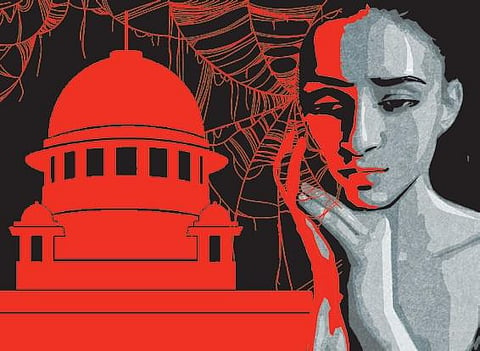

Prosecuting sex crimes is starting to seem like an impossible business. Just ask Sakshi Malik, Vinesh Phogat, the victims in Kalakshetra or the hundreds of other women who have reported cases of sexual assault and harassment only to run into a wall of resistance designed to grind them down till they are silenced for good. This is not a problem unique to India. Even in the post #MeToo world, there are those like Judge Robin Camp aka the ‘Knees-
Together Judge’ who, in 2017, ruled against the 19-year-old complainant, citing that she could have prevented being raped if she had just kept her knees together. The verdict was upheld in a retrial with a new judge. There are others like Camp who find in favour of the aggressor, brazenly spouting bilge along similar lines. The issues resulting in the miscarriage of justice when it comes to sex-related offences are easy enough to pinpoint.
The abysmally low conviction rate is due to how rape is largely perceived. Thanks to movies and cheap pornography, where the violation of women is either mined for maximum titillation or the gore factor, victims are either believed to be into it or are expected to kill themselves, since suicide is the only ‘honourable’ course of action for a woman whose ‘purity’ has been sullied. Those ‘unnatural’ creatures who refuse to shut up, opting to file cases against perpetrators, are seen as uppity harridans who are routinely retraumatised, accused of promiscuity, threatened, and disbelieved. It doesn’t help that in a world where fake news is peddled as the truth and increasingly Leftist/Rightist ideology-driven journalism, where the detached commitment to reporting the facts alone has become an obsolete practice, it is easy enough to dismiss survivors as making it all up for their five seconds of fame or levelling false charges as revenge against former boyfriends after ugly breakups.
The burden of proof rests with the accuser and, in most cases, bulletproof evidence that sexual violence occurred is impossible to produce. Mostly, it comes down to a ‘he said, she said’ scenario. Many powerful defendants have no trouble quashing the cases even when there are multiple complainants, and strike back by filing defamation cases against those who named and shamed them publicly.
The legal system designed by men for men, is stacked against the survivors. It takes forever for a case to make it to the courts, requiring the expenditure of money, time and effort. Most back off unable to withstand the bullying of aggressive lawyers and public censure. Those who don’t are more likely to be claimed by old age before a verdict is delivered. And even then, it is unlikely to be favourable.
Women fighting for justice face insurmountable challenges worsened by caste bias, illiteracy, poverty, rank corruption and a legal system that fails them repeatedly. But now, more than ever, it is imperative to keep fighting the odds. To do that, we must never give up and add our voices to those of the brave women who refuse to be silenced, though they have everything to lose.
Anuja Chandramouli
Author and new age classicist
anujamouli@gmail.com